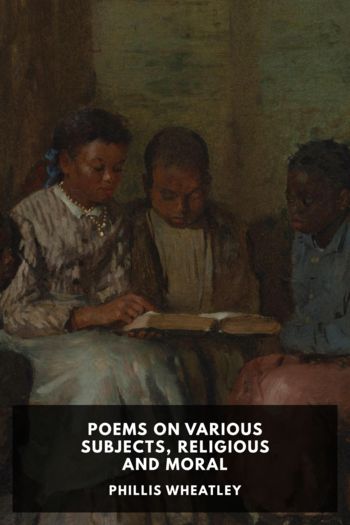The Autobiography of Benjamin Franklin - Benjamin Franklin (pocket ebook reader .txt) 📗

- Author: Benjamin Franklin
Book online «The Autobiography of Benjamin Franklin - Benjamin Franklin (pocket ebook reader .txt) 📗». Author Benjamin Franklin
Thomas was bred a smith under his father; but, being ingenious, and encouraged in learning (as all my brothers were) by an Esquire Palmer, then the principal gentleman in that parish, he qualified himself for the business of scrivener; became a considerable man in the county; was a chief mover of all public-spirited undertakings for the county or town of Northampton, and his own village, of which many instances were related of him; and much taken notice of and patronized by the then Lord Halifax. He died in 1702, January 6, old style,7 just four years to a day before I was born. The account we received of his life and character from some old people at Ecton, I remember, struck you as something extraordinary, from its similarity to what you knew of mine. “Had he died on the same day,” you said, “one might have supposed a transmigration.”
John was bred a dyer, I believe of woollens, Benjamin was bred a silk dyer, serving an apprenticeship at London. He was an ingenious man. I remember him well, for when I was a boy he came over to my father in Boston, and lived in the house with us some years. He lived to a great age. His grandson, Samuel Franklin, now lives in Boston. He left behind him two quarto volumes, MS., of his own poetry, consisting of little occasional pieces addressed to his friends and relations, of which the following, sent to me, is a specimen.8 He had formed a shorthand of his own, which he taught me, but, never practising it, I have now forgot it. I was named after this uncle, there being a particular affection between him and my father. He was very pious, a great attender of sermons of the best preachers, which he took down in his shorthand, and had with him many volumes of them. He was also much of a politician; too much, perhaps, for his station. There fell lately into my hands, in London, a collection he had made of all the principal pamphlets relating to public affairs, from 1641 to 1717; many of the volumes are wanting as appears by the numbering, but there still remain eight volumes in folio, and twenty-four in quarto and in octavo. A dealer in old books met with them, and knowing me by my sometimes buying of him, he brought them to me. It seems my uncle must have left them here when he went to America, which was about fifty years since. There are many of his notes in the margins.
This obscure family of ours was early in the Reformation, and continued Protestants through the reign of Queen Mary, when they were sometimes in danger of trouble on account of their zeal against popery. They had got an English Bible, and to conceal and secure it, it was fastened open with tapes under and within the cover of a joint-stool. When my great-great-grandfather read it to his family, he turned up the joint-stool upon his knees, turning over the leaves then under the tapes. One of the children stood at the door to give notice if he saw the apparitor coming, who was an officer of the spiritual court. In that case the stool was turned down again upon its feet, when the Bible remained concealed under it as before. This anecdote I had from my uncle Benjamin. The family continued all of the Church of England till about the end of Charles the Second’s reign, when some of the ministers that had been outed for nonconformity, holding conventicles9 in Northamptonshire, Benjamin and Josiah adhered to them, and so continued all their lives: the rest of the family remained with the Episcopal Church.
Josiah, my father, married young, and carried his wife with three children into New England, about 1682. The conventicles having been forbidden by law, and frequently disturbed, induced some considerable men of his acquaintance to remove to that country, and he was prevailed with to accompany them thither, where they expected to enjoy their mode of religion with freedom. By the same wife he had four children more born there, and by a second wife ten more, in all seventeen; of which I remember thirteen sitting at one time at his table, who all grew up to be men and women, and married; I was the youngest son, and the youngest child but two, and was born in Boston, New England.10 My mother, the second wife, was Abiah Folger, daughter of Peter Folger, one of the first settlers of New England, of whom honorable mention is made by Cotton Mather,11 in his church history of that country, entitled Magnalia Christi Americana, as “a godly, learned Englishman,” if I remember the words rightly. I have heard that he wrote sundry small occasional pieces, but only one of them was printed, which I saw now many years since. It was written in 1675, in the homespun verse of that time and people, and addressed to those then concerned in the government there. It was in favour of liberty of conscience, and in behalf of the Baptists, Quakers, and other sectaries that had been under persecution, ascribing the





Comments (0)